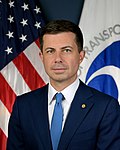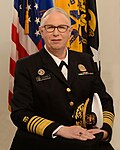Federal
Executive
This section needs additional citations for verification .(March 2025) |
In addition to the politicians listed below, Jenny Durkan, who served as United States attorney for the Western District of Washington from 2009 to 2014, is believed to be the first openly gay United States attorney. [1] Furthermore, in 2013, Demetrios Marantis became the first openly LGBTQ person to serve in a cabinet-level position in the Cabinet of the United States, serving in the Cabinet of Barack Obama as the acting United States trade representative following the departure of Ron Kirk.[ citation needed ]
| Image | Name | Entered office of first | Departed office of first | Office of first | Notes |
|---|---|---|---|---|---|
 | Roberta Achtenberg | 1993 | 1995 | Assistant Secretary of Housing and Urban Development for Fair Housing and Equal Opportunity | Achtenberg is the first openly LGBTQ person appointed to a federal position requiring confirmation by the United States Senate. [2] She later became a commissioner for the United States Commission on Civil Rights in 2011. [3] |
 | James C. Hormel | September 8, 1999 | January 1, 2001 | United States ambassador to Luxembourg | Hormel was the first openly gay man to represent the United States as an ambassador. |
 | John Berry | April 13, 2009 | April 13, 2013 | Director of the Office of Personnel Management | Berry is the first openly gay head of a federal agency. [4] |
 | Sharon Lubinski | January 2010 | December 2016 | United States marshal for the District of Minnesota | Lubinski was the first openly gay United States marshal. [5] |
 | Chai Feldblum | March 27, 2010 | July 1, 2018 | Commissioner of the Equal Employment Opportunity Commission | Feldblum is the first openly LGBTQ commissioner of the Equal Employment Opportunity Commission. [6] |
 | Eric Fanning | May 18, 2016 | January 20, 2017 | Secretary of the Army | Fanning is the first openly gay leader of a U.S. military service. [7] |
 | Pete Buttigieg | February 3, 2021 | January 20, 2025 | Secretary of Transportation | Buttigieg is the first openly LGBTQ Cabinet member confirmed by the U.S. Senate. [8] [9] Buttigieg was the first openly gay person in the presidential line of succession, ranking 14th.[ citation needed ] |
 | Rachel Levine | March 26, 2021 | January 20, 2025 | Assistant Secretary for Health | Levine is the first openly transgender official to be confirmed by the U.S. Senate. [10] [11] |
 | Scott Bessent | January 28, 2025 | Incumbent | Secretary of the Treasury [12] | Bessent is the first openly gay treasury secretary and is also the highest-ranking openly LGBTQ person in the presidential line of succession, ranking 5th. [13] |
Legislative
This section needs additional citations for verification .(March 2025) |
House of Representatives
| Image | Name | Start of first congressional term | End of last congressional term | Congressional district | Notes |
|---|---|---|---|---|---|
 | Barney Frank | January 3, 1981 | January 3, 2013 | MA-4 | Upon coming out voluntarily in 1987, [14] Frank became the first openly LGBTQ member of Congress. |
 | Tammy Baldwin | January 3, 1999 | January 3, 2013 [a] | WI-2 | Baldwin is the first openly LGBTQ member of Congress to have come out at the time of her first election into the legislative branch. |
 | Jared Polis | January 3, 2009 | January 3, 2019 | CO-2 | Polis is the first openly gay male congressman to have come out at the time of his first election into the legislative branch. |
 | Kyrsten Sinema | January 3, 2013 | January 3, 2019 [b] | AZ-9 | Sinema is the first openly bisexual member of Congress. [15] |
 | Mark Takano | January 3, 2013 | Incumbent | CA-41 (until 2023) | Takano is the first openly LGBTQ Asian American member of Congress. |
| CA-39 (since 2023) | |||||
 | Sharice Davids | January 3, 2019 | Incumbent | KS-3 | Davids is the first openly LGBTQ Native American member of Congress. |
 | Mondaire Jones | January 3, 2021 | January 3, 2023 | NY-17 | Alongside Ritchie Torres, Jones is the first openly LGBTQ African American member of Congress. |
 | Ritchie Torres | January 3, 2021 | Incumbent | NY-15 | Alongside Mondaire Jones, Torres is the first openly LGBTQ African American member of Congress. Torres is also the first openly LGBTQ Latino member of Congress. |
 | Sarah McBride | January 3, 2025 | Incumbent | DE-AL | McBride is the first openly transgender member of Congress. |
Senate
| Image | Name | Start of first congressional term | End of last congressional term | State | Notes |
|---|---|---|---|---|---|
 | Tammy Baldwin | January 3, 2013 [c] | Incumbent | Wisconsin | Baldwin is the first openly LGBTQ United States senator. [16] |
 | Kyrsten Sinema | January 3, 2019 [d] | January 3, 2025 | Arizona | Sinema is the first openly bisexual United States senator. |
 | Laphonza Butler | October 3, 2023 | December 8, 2024 | California | Butler is the first openly LGBTQ African American United States senator. |








